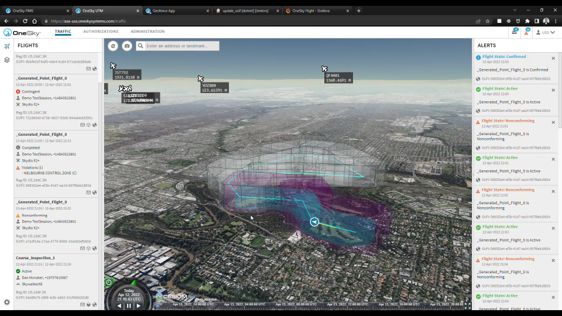Airservices Australia has selected Uncrewed Traffic Management (UTM) services provider OneSky to continue to Phase 3 in the development a working prototype of a Flight Information Management System (FIMS) for Australia’s UTM ecosystem. OneSky is partnered with AAM Group, Airbus, and Resilienx to deliver a full system.
The Airservices tender called for providers to build out a concept for FIMS tailored to the needs of the Australian aviation industry. While FIMS can refer to an interface between an Air Traffic Management System and UTM for the transfer of data, OneSky aims is to collaborate with Airservices to create a platform for a wide variety of services: one that will ensure that drones operate safely within regulations and have minimum impact on other aircraft and the communities they fly over, and ensure “efficient, fair, and competitive access to airspace.”
Airservices selected four global UTM providers for the FIMS development project at the start of 2022.
According to the OneSky press release, building a system that meets global standards presents a challenge. Integrating this system with the wide variety of aircraft, communications systems, and services that comprise a cooperative system is an even greater difficulty. OneSky’s integration framework is designed to make it easy for new users to access the system.
“We have brought in leading thought leaders to add their unique contributions to the effort,” says Daniel Honaker, OneSky Head of International Implementation. AAM Group is a world leader in geospatial data; as any UTM framework is a “system of systems,” Airbus is a recognied world expert on fairness in airspace access. Resilienx brings their expertise in system conformance monitoring and safety assurance to the project.
Airservices Chief Customer Experience Strategy Officer Peter Curran said FIMS will be a central component of the Uncrewed Aircraft System Traffic Management (UTM) ecosystem, providing common situational awareness among everyone operating in Australian airspace. “The expected growth of new airspaces users and new aircraft types – all with different automation, digitisation and intelligence systems – presents an exciting opportunity for Airservices to work collaboratively with industry to develop the FIMS and provide safe, efficient and equitable access to airspace for traditional as well as new airspace users,” said Peter Curran.
“FIMS will facilitate the exchange of information between all stakeholders – air traffic control, traditional aircraft and drone operators – to enable the safest and most efficient use of mixed-traffic airspace.”
Daniel Honaker says that Australia’s concept for UTM is groundbreaking. “This is one of the most comprehensive, well thought-out system specifications that we’ve seen,” says Honaker. “We started developing UTM solutions in 2015 and have been spiraling development to continue to meet the needs of the UTM space ever since,” says Honaker. “As such, we have a strong foundation of both the basic infrastructure and advanced services. We believe we have a very flexible architecture, and we can meet Airservices’ hybrid approach,” Honaker says. “We’re in complete alignment in terms of their concept and development roadmap, and our services already check many of the boxes of their requirements.”
“We’ve learned no one company solves all of this themselves – we’re very excited to be part of this small group of RFP recipients, and we’re looking forward to collaborating with our partners and demonstrating the OneSky solution for Australia,” says OneSky CEO Bob Hammett. “What Airservices Australia was looking for was something more advanced than the basic UTM system,” Hammett says. “Their requirements are very robust, and they reflect their advanced thinking on the UTM needs for Australia.”
The deliverable for the Airservices RFP is significant: but it’s only the start. OneSky will deliver a fully functioning FIMS prototype that allows for qualified USS providers to participate, forming the bridge between the actual drone operator and the UTM system. Based on the prototype, the ASA concept could be used around the world to advance uncrewed systems. “We hope to form a long-term partnership with Airservices as they work to advance these concepts globally,” says Hammett.
“We’re in this for the long run, and we want to see its success. Not only in this next phase where we bring in uncrewed aircraft, but for the later phases of urban and advanced air mobility.”
For more information contact:
www.onesky.xyz




